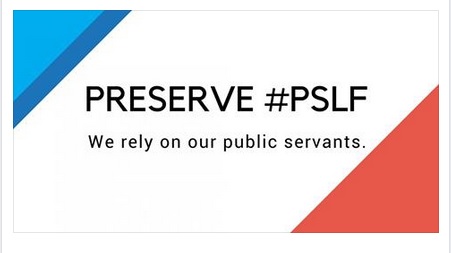I’ve been concerned about Public Service Loan Forgiveness for a while. Since October 2017 when the first folks became eligible for forgiveness but 1 in 3 applications were denied, partly because the guidelines were unclear and there was no way to check ahead of time if you were doing things right to qualify.
You must do at least three things right: have the right sort of Federal student loans; be in the right sort of income-driven repayment plan; be in qualifying employment before you start making your on-time payments for ten years. I have my vested interest in this. I’ve been working in the public interest, with my loans in an income-based repayment plan, making my monthly payment on time, for about six years. I’m a little over halfway there. Spouse and I will still both be middle-aged, just in our 50’s, though a bit older than someone who graduated law school in their 20’s when the program already existed.
Public service loan forgiveness is not an unearned benefit. It’s not a gift. Public service loan forgiveness is an investment in our communities. When a person spends years and tens of thousands of dollars on their own education in order to work in the public interest–as a nurse, a teacher, a public defender, a civil servant, a fireman–they have incurred debt and restricted their family’s income potential in order to serve all of us, in order to make our cities, our towns, our neighborhoods healthy and functional for everyone.
As a society, we owe it to our public service professionals to support their investment in us. Please take a few minutes to call your member of the House of Representatives and tell them you hope they’ll protect Public Service Loan Forgiveness, a George Bush era reform which passed with over-whelming bi-partisan support (The House of Representatives approved the law 292 to 97; the Senate vote was 79 to 12).
Action 2: Tell Your Rep. to Protect Federal Financial Aid and Education Oversight
Late last year, while reauthorizing the Higher Education Act, Republicans on the House Committee on Education and the Workforce approved the PROSPER Act (H.R.4508). This harmful bill decreases federal financial aid and rolls back regulations that protect students from predatory for-profit colleges and trade schools.
The PROSPER Act ends three important financial aid programs:
- The Public Service Loan Forgiveness program
- Subsidized student loans that allow low income students to avoid interest payments while in school
- The Federal Supplemental Educational Opportunity Grant
It also increases minimum loan repayments, eliminates debt forgiveness horizons, and requires a minimum monthly payment even for borrowers near and below the poverty line. Modeling by the Center for American Progress shows that these changes may raise loan repayments for low income students by tens of thousands of dollars and increase the time they are repaying loans by decades. In addition, the PROSPER Act eliminates key safeguards that protect students, including the “90/10 rule” (which bars for-profit colleges from getting more than 90% of their revenue from federal aid), as well as the gainful employment regulation (which prevents career training programs with poor educational outcomes from receiving federal money). The bill also weakens regulatory power by removing states’ power to oversee online schools, and it hinders state efforts to hold student loan providers accountable.
By making it harder for students to afford higher education, the PROSPER Act prioritizes private industry interests while increasing the burden on Americans.
- Find your House rep’s contact info (It’s easiest to find your rep’s info and appropriate script in Amplify. Download and start using it)
Script: Hello, my name is [NAME] and I’m a constituent from {ZIP CODE} and member of Indivisible Chicago.
I am calling to ask {PERSON} to oppose the PROSPER Act (H.R. 4508) because this bill makes it harder for students to afford higher education and eliminates regulations that protect students from predatory for-profit schools.
Thank you for your hard work answering the phones.
[NOTE: If leaving a voicemail please leave your full street address to ensure you call is tallied.]




 I work at a four-person 501(c)(3) court reform organization, as an attorney. The organization cannot offer a retirement plan. Even with the ACA, it is unable to afford platinum health insurance plans and no dental or vision plans. PSLF and income-based repayment are the only reason I am able to save for retirement on my own. I have invested in myself and relied upon the promise of loan forgiveness in choosing a career that allows me to invest in my city. Please tell me you will stand up for me and others who have done the same.
I work at a four-person 501(c)(3) court reform organization, as an attorney. The organization cannot offer a retirement plan. Even with the ACA, it is unable to afford platinum health insurance plans and no dental or vision plans. PSLF and income-based repayment are the only reason I am able to save for retirement on my own. I have invested in myself and relied upon the promise of loan forgiveness in choosing a career that allows me to invest in my city. Please tell me you will stand up for me and others who have done the same.